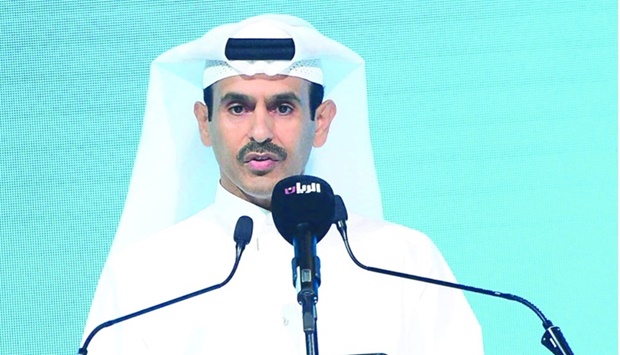Continuing to achieve impressive results, the second phase of the National Programme for Conservation and Energy Efficiency (Tarsheed) helped Qatar record savings worth more than QR4bn by the end of last year.
This was revealed by HE the Minister of State for Energy Affairs Saad bin Sherida al-Kaabi during Tarsheed’s 10th anniversary celebrations Sunday.
The programme helped save roughly 14,000 GWh of electricity, more than 100mn cubic metre of water, and an estimated 138,000mn cubic ft of gas. It also led to a reduction in emissions, amounting to approximately 8,500mn kg of carbon dioxide.
HE the Minister of State for Energy Affairs said efforts will be strengthened during the third phase of the programme, which runs from April 2022 until 2030. “More goals will be set and attention will be paid to a number of issues that touch on the core work in the electricity and water sectors, including the strategy for electric cars and work to establish 1,000 electric charging stations by 2025. Also, energy efficiency will be enhanced while work on initiatives related to sustainability will be initiated while confronting climate change and reducing carbon emissions,” he said, adding that Tarsheed has worked during the first half of the last decade according to a plan that is aimed at achieving sustainability goals in energy efficiency and expanding the use of renewable energy in Qatar in line with Qatar National Vision 2030, the National Strategy 2018-2022, the Qatar Strategy Environment and Climate Change 2021-2025 and the UN Sustainable Development Goals.
HE al-Kaabi highlighted the accomplishments of the programme's second phase that ran from 2018 to 2022, noting that it was characterised by increasing the efficiency of electricity and water utilisation, optimising and diversifying energy resources, and working on the development of rationalised communities and smart cities, in addition to combating climate change.
He thanked the tireless and sincere efforts of all those in charge of the programme and its employees, stressing that their work helped raise the level of efficiency of devices and equipment in Qatar.
Kahramaa president Essa bin Hilal al-Kuwari noted that Tarsheed would continue to work to enhance the achievements by preparing and developing regulations and legislation related to energy rationalisation and energy efficiency. “This will be accomplished while adopting the latest technologies that are compatible with our environment and prepare us for the stage of the knowledge economy and smart Qatar. We will also continue the circular economy methodology to take advantage of all elements from water treatment and the uses of smart agriculture, through the applications of electric vehicles and renewable energy, especially solar energy, to zero waste of water and electricity,” he said.
“Tarsheed is considered a basis for reducing harmful carbon emissions, in order to reach the target of 8mn tonnes annually by 2030 while taking into account the social and economic growth in the country and maintaining a high level of wellbeing for all,” he added.
This was revealed by HE the Minister of State for Energy Affairs Saad bin Sherida al-Kaabi during Tarsheed’s 10th anniversary celebrations Sunday.
The programme helped save roughly 14,000 GWh of electricity, more than 100mn cubic metre of water, and an estimated 138,000mn cubic ft of gas. It also led to a reduction in emissions, amounting to approximately 8,500mn kg of carbon dioxide.
HE the Minister of State for Energy Affairs said efforts will be strengthened during the third phase of the programme, which runs from April 2022 until 2030. “More goals will be set and attention will be paid to a number of issues that touch on the core work in the electricity and water sectors, including the strategy for electric cars and work to establish 1,000 electric charging stations by 2025. Also, energy efficiency will be enhanced while work on initiatives related to sustainability will be initiated while confronting climate change and reducing carbon emissions,” he said, adding that Tarsheed has worked during the first half of the last decade according to a plan that is aimed at achieving sustainability goals in energy efficiency and expanding the use of renewable energy in Qatar in line with Qatar National Vision 2030, the National Strategy 2018-2022, the Qatar Strategy Environment and Climate Change 2021-2025 and the UN Sustainable Development Goals.
HE al-Kaabi highlighted the accomplishments of the programme's second phase that ran from 2018 to 2022, noting that it was characterised by increasing the efficiency of electricity and water utilisation, optimising and diversifying energy resources, and working on the development of rationalised communities and smart cities, in addition to combating climate change.
He thanked the tireless and sincere efforts of all those in charge of the programme and its employees, stressing that their work helped raise the level of efficiency of devices and equipment in Qatar.
Kahramaa president Essa bin Hilal al-Kuwari noted that Tarsheed would continue to work to enhance the achievements by preparing and developing regulations and legislation related to energy rationalisation and energy efficiency. “This will be accomplished while adopting the latest technologies that are compatible with our environment and prepare us for the stage of the knowledge economy and smart Qatar. We will also continue the circular economy methodology to take advantage of all elements from water treatment and the uses of smart agriculture, through the applications of electric vehicles and renewable energy, especially solar energy, to zero waste of water and electricity,” he said.
“Tarsheed is considered a basis for reducing harmful carbon emissions, in order to reach the target of 8mn tonnes annually by 2030 while taking into account the social and economic growth in the country and maintaining a high level of wellbeing for all,” he added.


